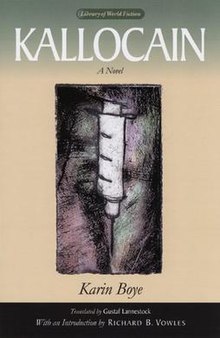 | |
| Author | Karin Boye |
|---|---|
| Language | Swedish |
| Genre | Dystopian, political, social science fiction |
| Publisher | Bonniers |
| Media type | |
| Pages | 220 |
| ISBN | 978-0-29903894-6 |
Kallocain is a 1940 dystopian novel by Swedish novelist Karin Boye that envisions a future of drab terror. Seen through the eyes of the idealistic scientist Leo Kall, Kallocain is a depiction of a totalitarian world state. An important aspect of the novel is the relationships and connections between the various characters, such as the marriage of the main character and his wife, Linda Kall, and the feelings of jealousy and suspicion that may arise in a society with heavy surveillance and legal uncertainty.
One of the novel's central ideas coincides with contemporary rumors of truth drugs that ensured the subordination of every citizen to the state. Both Aldous Huxley's Brave New World (1932) and Boye's Kallocain are drug dystopias, or societies in which pharmacology is used to suppress opposition to authority. However, unlike Brave New World in which a drug is used to suppress the urge to nonconformity generally, a drug in Kallocain is used to detect individual acts and thoughts of rebellion.[citation needed]
Kallocain was well received by contemporary Swedish critics on its publication in 1940.[1] It has since been published in numerous Swedish editions and has been translated into more than 10 languages; English-language translations include those by Gustaf Lannestock (2002, University of Wisconsin Press)[2] and David McDuff (2019, Penguin Classics).[3] It was adapted into a television miniseries in 1981 by Hans Abramson.
In 2016, the novel was nominated for the Retro-Hugo award for the best science fiction novel of 1941.[4]
- ^ Davidson, Bengt Framtidsromanen Kallocain Karin Boye-sällskapet (in Swedish)
- ^ Boye, Karin (2002). Kallocain: A Novel. Univ of Wisconsin Press. ISBN 9780299038946.
- ^ Boye, Karin (28 November 2019). Kallocain: A Novel from the 21st Century. National Geographic Books. ISBN 978-0-24135558-9.
- ^ "1941 Retro-Hugo Awards". World Science Fiction Society. 29 December 2015. Retrieved 2016-04-28.